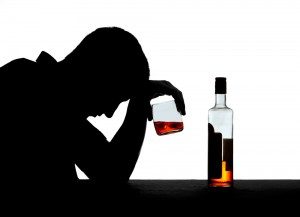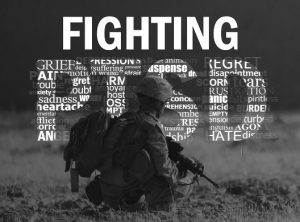Relationship Between Post-Traumatic Stress Disorder, Depression, and Alcohol Consumption.

 Post-traumatic stress disorder is when an individual cannot forget a traumatic event and experiences it again and again in their minds. These individuals are much more likely to use alcohol to help them cope with their traumatic memories and avoid the anxiety that comes with it. The paper “Post-traumatic stress disorder symptoms, anxiety sensitivity, and alcohol-use motives in college students with a history of interpersonal trauma .” by Erin C Berenz, Salpi Kevorkian, . Nadia Chowdhury, Danielle M Dick, Kenneth S. Kendler, and Ananda B. Amstadter looks at the connection between PTSD, alcohol use and anxiety sensitivity. Read further to learn about the connection between these three things.
Post-traumatic stress disorder is when an individual cannot forget a traumatic event and experiences it again and again in their minds. These individuals are much more likely to use alcohol to help them cope with their traumatic memories and avoid the anxiety that comes with it. The paper “Post-traumatic stress disorder symptoms, anxiety sensitivity, and alcohol-use motives in college students with a history of interpersonal trauma .” by Erin C Berenz, Salpi Kevorkian, . Nadia Chowdhury, Danielle M Dick, Kenneth S. Kendler, and Ananda B. Amstadter looks at the connection between PTSD, alcohol use and anxiety sensitivity. Read further to learn about the connection between these three things.
1. Could you touch a bit on what the research is for our audience who may be learning about it for the first time?
Young adulthood is when we often see the onset of alcohol use disorder. Individuals who have experienced traumatic events, like physical or sexual assault, are at even greater risk for developing problems with alcohol, particularly if they exhibit symptoms of post-traumatic stress disorder (PTSD). PTSD symptoms include things like re-experiencing one or more traumatic events through intrusive memories or nightmares, struggling with negative thoughts and feelings, making efforts to avoid trauma reminders, and feeling on guard or on edge. We think that one reason that individuals with PTSD are at heightened risk for alcohol use disorder is that they are motivated to use alcohol to manage or cope with their symptoms.
2. What got you interested in doing this research?
I am really interested in studying processes that we are able to change through clinical intervention. We know that being a woman increases someone’s risk for PTSD, but gender is not a treatment target. PTSD symptoms can be improved through cognitive-behavioral therapy. Similarly, we know from the literature that anxiety sensitivity can be reduced through a single-session intervention. To me, that makes these very promising targets for trying to impact alcohol use problems in college students.
 3. What relationship did you find between PTSD, anxiety sensitivity and drinking alcohol as a method of coping?
3. What relationship did you find between PTSD, anxiety sensitivity and drinking alcohol as a method of coping?
Since not all individuals with PTSD develop problems with alcohol, we are really interested in figuring out what predicts who might go on to use alcohol to self-medicate. What we learned in this study is that college students who are suffering from PTSD symptoms following an assault are more likely to report using alcohol to cope with negative emotions if they score high in a trait called anxiety sensitivity. Anxiety sensitivity refers to how anxious someone becomes as a result of experiencing physiological arousal (ex: racing heart, breathing difficulties, sweating). For example, someone high in anxiety sensitivity might notice an increase in their heart rate and wonder if they are having a heart attack. What we think is that individuals who see the arousal symptoms of PTSD as dangerous are more motivated to find ways to dampen that arousal. Alcohol is a depressant, which means that it may temporarily decrease an individual’s arousal. The problem is that alcohol worsens PTSD symptoms in the long run, and excessive alcohol use places individuals at greater risk for further trauma exposure, such as sexual assault.
4. Do you think people with high anxiety have a higher chance of drinking, with or without PTSD?
Several studies do support links between anxiety sensitivity and different measures of alcohol use. However, I don’t think we know enough to be able to say whether being high in anxiety sensitivity causes an individual to start drinking, or causes an individual to develop problem drinking. Regardless, we know that high anxiety sensitivity is associated with greater difficulties discontinuing various kinds of substances after a problem has emerged.
5. Do you think symptoms of PTSD caused by accidental trauma lead to the same amount of alcohol dependency as interpersonal trauma?
PTSD symptoms resulting from accidental traumas do also place individuals at risk for alcohol use problems, and PTSD symptoms that are related to accidental traumas are equally serious. One of the reasons I often focus on survivors of interpersonal trauma, such as sexual assault, is that interpersonal trauma is much more likely to result in PTSD than accidental trauma. In addition, interpersonal trauma in and of itself is more strongly associated with alcohol use and alcohol use disorder compared to accidental trauma, even in the absence of PTSD.

6. What do you think can be done to help individuals find a better way to cope with PTSD and anxiety?
Effective treatments for PTSD do exist, and I would encourage anyone suffering from PTSD symptoms to find a provider that specializes in one of these tried-and-true cognitive-behavioral approaches. Specifically, prolonged exposure therapy is an intervention that is focused on helping an individual process their traumatic experience(s) in a supportive context. Prolonged exposure involves confronting both the memories of the trauma, as well as reminders of the trauma. Prolonged exposure helps an individual gain control over the memories and their life. Cognitive processing therapy is another equally effective intervention which focuses on helping an individual to challenge some of the negative thoughts about themselves and the world that they may have developed as a result of their traumatic experiences. It is important for someone seeking treatment for PTSD symptoms to be an informed consumer and insist on seeing a provider who is trained in one of these approaches.
7. With your research, what do you hope to see from it within the next year or so?
I am currently running a NIAAA-funded study, in which I am looking at the effects of PTSD and anxiety sensitivity on craving in the laboratory. My team and I are recruiting college students with a history of physical or sexual assault and regular alcohol use to complete a trauma and alcohol cue reactivity study. Participants listen to either a description of their most bothersome traumatic event or a neutral description, after which they are presented with either their typical alcoholic beverage or a glass of water. They don’t consume the alcohol, but we are able to measure how their level of craving for alcohol varies as a function of the combination of these cues. We think we will see that those with greater PTSD symptoms and higher anxiety sensitivity will exhibit greater craving and salivation in response to their trauma memory compared to those with low PTSD symptoms and low anxiety sensitivity.
8. What are some challenges you faced during the times of your research?
I have been fortunate in that I have been well supported in my efforts to conduct this research. People who aren’t in this field often assume that it is difficult to find participants willing to come to our lab and discuss their trauma histories, but that has not been my experience at all. We are constantly amazed by and appreciative of the trust that our participants place in us when they open up to us about traumatic experiences that they may or may not have ever told anyone about. The rewards of doing this work are much greater than the challenges.
9. Do you have additional resources or further readings for those who want to learn more about the topic?
To learn more about prolonged exposure therapy:
http://www.div12.org/psychological-treatments/disorders/post-traumatic-stress-disorder/prolonged-exposure-therapy/
To learn more about cognitive processing therapy:
http://www.div12.org/psychological-treatments/disorders/post-traumatic-stress-disorder/cognitive-processing-therapy/
To learn more about alcohol use disorder:
https://www.niaaa.nih.gov/alcohol-health/overview-alcohol-consumption/alcohol-use-disorders
This research showed that people with PTSD that have higher anxiety sensitivity seem to be more likely to turn to alcohol as a solution. This can help psychologists come up with better ways to help patients suffering from PTSD that have higher anxiety sensitivity to cope with their anxiety without turning to alcohol.




Responses